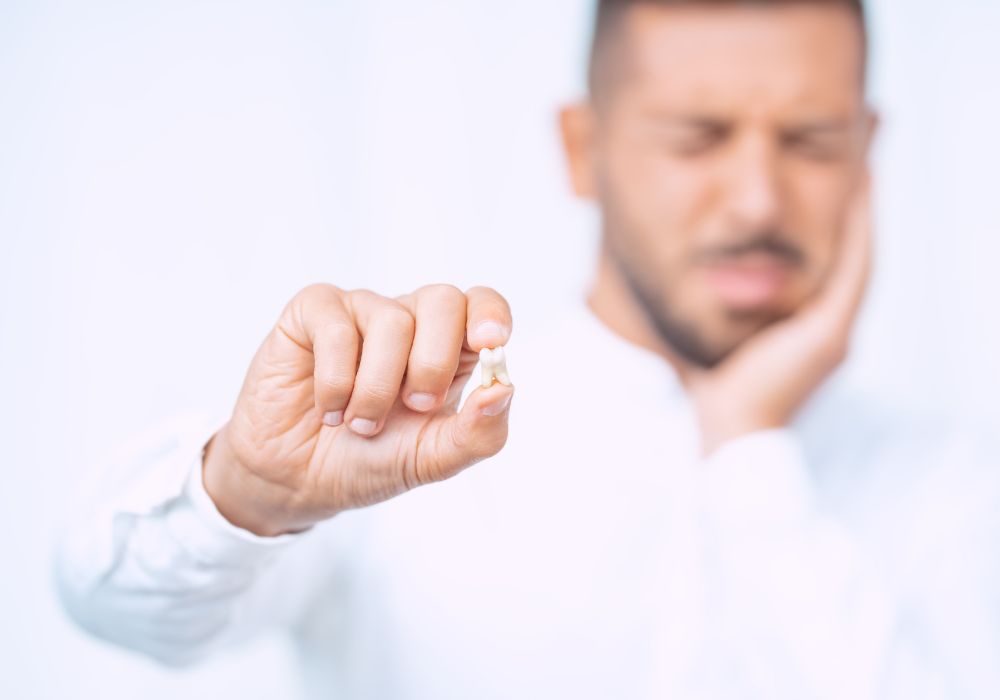If you’re scheduled to have your wisdom teeth extracted, you may be worried about a number of things. Some people spend most of their worry on the procedure itself, while others want to know how soon they can eat solid food after the surgery.
You can start eating solid food a week after the removal of your wisdom teeth, but you should still avoid “sharp” or spicy foods. After your second week, your mouth should have healed enough to resume your usual diet.
Eating after wisdom teeth removal is a tricky subject, although plenty go through the process with little issue. Understanding the healing process and the appropriate diet at each stage can help you stock your fridge properly and recover as soon as possible.
How Long After Tooth Extraction Can You Eat Solid Food?
A Timeline of Eating or Drinking After Wisdom Teeth Removal
Healing after your wisdom teeth extraction happens in stages:
- Inflammatory stage: immediately after wisdom tooth removal; immune system takes charge in cleansing the area; expect swelling and pain for a few days
- Repair stage: once inflammation passes; body starts to repair the tissue and bone affected by the wisdom tooth extraction
- Remodeling stage: body rebuilds the bone around the socket(s)
Most people are able to eat solid food soon after reaching the repair stage. Until then, you need to stick to soft, easy-to-eat foods that will provide your body with the nutrients it needs.
Days 1 and 2: Soft Foods You Don’t Need to Chew
You probably won’t be hungry until the general anesthesia from your procedure wears off, but once your appetite returns you want something easy to consume. For your first meals, stay as close to liquid as you can. This includes:
- Soups/broths (you can blend chunky soups to retain the nutrients and flavor)
- Juice
- Smoothies (with a spoon)
- Yogurt
- Pudding
- Refried beans
- Mashed potatoes
- Jello
- Regular ice cream (no nuts or chunks)
- Apple sauce
- Cottage cheese
It’s important to stick with smooth textures that won’t disturb the blood clots that form soon after extraction. Solid foods, spitting, or drinking through a straw can dislodge these clots, increasing your chance of developing dry socket and leading to a more painful healing process.
Days 3 to 7: Foods that are Nutrient-Rich and Require Minimal Chewing
Once you’ve left the inflammatory stage you should be clear to eat more solid, texturized food. This can be a nice change from the smooth diet from the previous days, and it usually includes nutritional foods like:
- Scrambled eggs
- Oatmeal
- Soft meat (i.e. chicken or salmon)
- Avocados
- Bananas
- Pureed or cooked fruits and vegetables
- Macaroni
The swelling and pain around the extraction site should subside by this point, although you may still experience discomfort along your gums. You should still take care not to disturb the area, but you have more freedom in what you can eat without complicating things.
Week 2: Normal Solid Food Diet (with Some Restrictions)
Once you hit your second week post-operation, you can pretty much eat as you did before. Some new additions to the menu include:
- Toast
- Rice
- Quinoa
- Solid meats
At this point, it’s easier to understand what to avoid than it is to compile a list of acceptable foods. You know your body better than anyone else, but we recommend you avoid overly crunchy foods (chips or crackers), spicy or acid flavors (peppers or citrus), and recreational snacks (like candy or alcohol).
A proper diet allows you to cinch up healing in these weeks with minimal issues. Once everything is more stable, you can completely return to your normal diet.
Foods, Drinks, and Behaviors to Avoid After Wisdom Teeth Removal

Some people work better with a list of things to avoid than they do in a shortlist of commonly accepted foods. If this is you, focus on this section.
In short, you want to steer clear away from:
- Drinking through straws, spitting, and rinsing your mouth (for the first few days)
- Sugary drinks and carbonated beverages
- Alcohol
- Smoking
- Poor oral hygiene
- Rigorous exercise
The goal is to limit things that will disrupt or inhibit healing. You already understand that harder foods can damage your soft gums as they repair, but these habits can be just as harmful.
Straws, Spitting, and Rinsing
Sucking through a straw, spitting, and rinsing (even with water or mouthwash) can easily dislodge or otherwise disrupt the blood clot in your extraction socket. We recommend avoiding these behaviors for the first 24 to 48 hours.
The blood clot is important for protecting the incision as well as the bone and nerve endings exposed by the procedure. Without it, you will experience great pain and are more susceptible to infection and inflammation.
This is the most common issue that occurs after wisdom teeth extraction, but it’s not easily managed through over-the-counter medication. Your dentist will need to prescribe a stronger pain killer, and you can further your healing timeline.
In most cases, sticking to the proper diet and avoiding habits known to dislodge the clot are enough to keep you on track.
Sugary and/or Carbonated Drinks
Drinks with a high-sugar content or carbonated drinks aren’t usually the most nutritious, but they pose a greater threat soon after a wisdom tooth extraction. Your mouth is more susceptible to bacteria at this time, so anything that contributes to cavities should be avoided.
The bubbles in carbonated beverages aren’t great for that blood clot either. While they’re mild when drinking, they’re powerful enough to dislodge the clots and can lead to painful dry sockets.
You should wait at least a week to drink soda again, but it’s better to hold out for a full six weeks.
Alcohol and Smoking
Alcohol and smoking inhibit the healing process. Even without dislodging the blood clot, these habits are known to dry out your mouth and interfere with repairs.
At the very least, you need to avoid alcohol and smoking for the first 48 hours. While this isn’t the ideal timeline, it should be long enough for a blood clot to establish in the socket. You still risk dislodging it, but it ensures a strong start.
Skipping Brushing or Flossing
As previously stated, your mouth is much more susceptible to bacteria after a tooth extraction. You want to stay on top of brushing and flossing twice a day, as well as mouthwash after the first 24 hours.
Even with the blood clot to protect it, bacteria will want to flock to your incision site. Proper oral hygiene habits allow your immune system to proceed without becoming overwhelmed, keeping healing right on schedule.
Rigorous Exercise or Activity
While wisdom teeth extraction isn’t akin to something like an appendectomy, it’s still a major surgery that takes its toll on you. You should take some time off work, school, or your usual responsibilities to relax and let your body focus on other things.
Even after the first few days, avoid exercise until you’ve overcome the “hump” of the healing process. Once things are on the downhill you can resume your normal routine, but you want to disrupt strenuous activity as much as possible.
Not only can this disrupt your healing, but it can cause you great discomfort. You may not realize your equilibrium is still off until you’re in a dangerous position, so give it at least 2 weeks.
When to Contact Your Dentist After Wisdom Teeth Removal
Your oral surgeon will usually send you home with a post-surgery care guide. In this, they will list out what is normal during recovery and situations when you need to contact them.
Usually, this includes:
- High fever (above 100°F)
- Drainage of pus or other fluid from the extraction site
- Rising pain levels (they should decrease over time, especially with pain medicine)
- Excessive bleeding (continuous bleeding after 24 hours; soaking through gauze in under an hour)
- Swelling (slight swelling is normal, but it should subside after the first 48 hours)
- Numbness (anesthesia should wear off after 24 hours at the latest)
These indicate there was either an issue with the procedure (although it’s usually something minor, like bruising a nerve) or that there’s an issue with the recovery. Following the suggested diet is important to avoid these issues, but understand that they may arise even with the most meticulous care.
Conclusion
No one will be there to micromanage your diet immediately after your wisdom teeth removal surgery, but it’s important to follow these general guidelines for as smoothing a healing process as possible. Your stomach may be ready for a spicy steak fajita, but your healing gums are begging you to wait.
Luckily, you can eat most solid foods within a week post-operation. Until then, focus on soft foods that you know you enjoy and try not to think too much about what you’re missing out on. With proper care, your favorite meals will be back on the menu soon enough.
If you’re still unsure about what you’re able to eat after wisdom teeth removal or have other questions to ask, please leave them in the comments!

